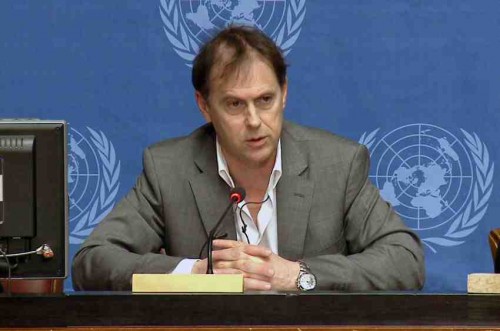The UN Office of the High Commissioner for Human Rights (OHCHR) called for the immediate release of Sheikh Ali Salman, Secretary-General of Al-Wefaq National Islamic Society, expressing its concerns about the verdict to be issued against him at the end of this month (June 2015), and about the trial of prominent human rights defender, Nabeel Rajab. The OHCHR also voiced its concerns about the continuous human rights abuses taking place in Jaw prison, calling for the launch of a genuine dialogue between the Government of Bahrain and the opposition without preconditions in addition to implementing the recommendations of the Human Rights Council's Universal Periodic Review in Geneva, and that of the Bahrain Independent Commission of Inquiry (BICI).
The spokesperson for the UN High Commissioner for Human Rights, Rupert Colville said: "We are concerned about the harsh treatment of detainees at the Jaw Prison in Bahrain following a riot there in early March which was put down by security forces using rubber bullets, tear gas and shotguns, resulting in many injuries but no deaths."
He further stated in a press conference, held on Friday, June 5, 2015: "After the riot was quelled, the detainees were allegedly forced to spend 10 days out in the open courtyard of the prison before eventually being placed in two large plastic tents (reportedly around 300 detainees per tent). Around 100 other detainees - those accused of instigating the unrest - were subsequently transferred to another section of the Jaw prison, and there are allegations that they were subjected to ill-treatment and torture."
"We urge the authorities to conduct impartial, speedy and effective investigations and to ensure that any victims of torture or ill-treatment have access to appropriate remedies. We remind the authorities in Bahrain there is an absolute prohibition of torture under international law. There are no exceptions whatsoever to that prohibition in any circumstances," Colville continued.
He further stressed: "We are also particularly concerned about two individuals currently in detention in Bahrain, namely Sheikh Ali Al-Salman, the Secretary General of Al-Wefaq political party and Nabeel Rajab, one of Bahrain's most prominent and respected human rights defenders."
"Sheikh Ali al-Salman was arrested on 28 December 2014. His pre-trial detention has been repeatedly extended since then, and he is expected to be sentenced later this month. Al-Salman and his lawyers say they have consistently been prevented by the court from presenting oral arguments. It is further reported that Al-Salman and his legal representatives have not been provided with any meaningful opportunity to examine the evidence," Colville added.
Colville reiterated the UN Human Rights Office's call for his immediate release, saying: "Back in January, as you may remember, the UN, including the UN Human Rights Office, called for his immediate release. We repeat that call today."
Concerning Nabeel Rajab, Colville said: "Nabeel Rajab was arrested on 2 April 2015 on charges related to insulting a statutory body (in other words, for reporting publicly on what was going on inside Jaw prison) and spreading rumours during wartime. If convicted, Rajab may face up to ten years in prison. He has already been sentenced to six months of detention, a verdict that was confirmed by the Court of Appeal on 14 May."
Rupert Colville ended his press conference by saying: "A lasting resolution to the instability that has plagued Bahrain is not going to be reached solely through reliance on security means or through repressive measures aimed at silencing critical voices. It needs to be through a genuine dialogue between the Government and the opposition without preconditions. In order to create a conducive environment, all sides should exercise maximum restraint and avoid further provocations. The path to such a solution is clearly laid down in the recommendations of the Human Rights Council's Universal Periodic Review here in Geneva, the Bahrain Independent Commission of Inquiry and Bahrain's National Human Rights Commission."
source : Bahrain Mirror
Tuesday
9 June 2015
6:17:11 AM
694505
OHCHR Calls for immediate Release of Sheikh Ali Salman and Transparent Investigations into Bahrain's Jaw Prison Events

The UN Office of the High Commissioner for Human Rights called for the immediate release of Sheikh Ali Salman, Secretary-General of Al-Wefaq National Islamic Society, and about the trial of prominent human rights defender, Nabeel Rajab.
